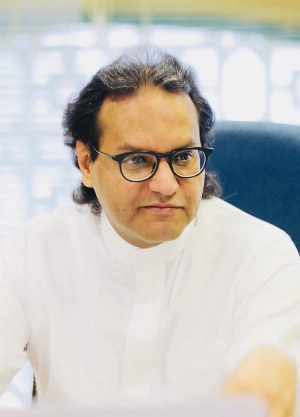Many may perceive the rapid changes unfolding in the region as sudden and unexpected developments. However, a closer look reveals that Saudi Arabia has been diligently working for years to address major challenges and drive these transformative shifts.
Call it what you will, but succinctly put, these are the fruits of the diplomacy spearheaded by Crown Prince and Prime Minister Mohammed bin Salman.
This diplomacy is characterized by patience, prudence, and a focus on long-term objectives, rather than impulsive reactions or narrow interests. At its core, it prioritizes the future and security of the region, where Saudi Arabia remains a key influential player.
The patience, coupled with strategic foresight and a commitment to rise above provocations, has yielded significant results.
For instance, in Lebanon, Saudi Arabia played a pivotal role in ending a 26-month presidential vacuum by fostering consensus among Lebanese political factions to elect General Joseph Aoun as president.
This was possible due to various factors, including the decline of Hezbollah’s influence and the collapse of Bashar Al-Assad’s regime in Syria. The latter had dominated Lebanon since the 1980s during the rule of Hafez Al-Assad.
Saudi Arabia’s diplomacy also extended to Iraq, convincing Prime Minister Mohammed Shia Al-Sudani to address the chaos caused by militias and armed groups.
Recognizing the need for stability, Al-Sudani launched initiatives to consolidate arms under the state’s authority, aiming to curtail foreign-backed militias that destabilize Iraq.
In Syria, following the fall of Assad’s regime, Saudi Arabia acted swiftly to support the country’s transition. It urged against a return to obsolete ideologies and dispatched delegations to free Syria to offer humanitarian and logistical assistance.
The new Syrian administration chose Saudi Arabia as the first destination for its foreign minister, symbolizing strong bilateral relations.
Lebanon’s case was no less complex. Saudi diplomacy played a significant role in encouraging Lebanese stakeholders to select General Joseph Aoun, a leader committed to Arab unity, as president.
In his inaugural speech, Aoun reaffirmed Lebanon’s Arab identity, pledged to restore ties with Arab nations —particularly Saudi Arabia— and emphasized that the state would monopolize the use of arms. True to his word, Aoun announced that his first official visit would be to Saudi Arabia.
While Crown Prince Mohammed bin Salman is primarily focused on achieving Vision 2030’s ambitious goals —spanning economic reform, political strategy, social development, and investment— he has remained deeply invested in Arab issues. His consistent warnings about regional instability are not mere rhetoric; they are accompanied by proactive diplomatic efforts.
During the Arab-American summit in Jeddah in 2022, the Crown Prince stressed to Arab leaders and then-U.S. President Joe Biden that tackling regional and global challenges requires a realistic and responsible approach.
He called for a “new phase” that inspires hope among the region’s youth for a brighter future and emphasized the need for political solutions to crises in Libya, Sudan, Syria, and Iraq.
At the Arab Summit hosted by Saudi Arabia in Jeddah on May 19, 2023, the Crown Prince reiterated his vision: “We will not allow our region to become a battleground for conflicts.” He affirmed Saudi Arabia’s commitment to peace, cooperation, and development.
This is the vision of a young Saudi leader whose values and principles shape his country’s diplomacy. The region’s recent transformations—whether in Syria, Lebanon, or Iraq—did not happen overnight.
They are the result of Saudi Arabia’s steadfast commitment to dialogue, resilience in the face of challenges, and refusal to succumb to provocations or misinformation campaigns.
The struggle is far from over. Saudi Arabia remains focused on resolving the Palestinian issue, achieving lasting peace in Sudan, and securing a peaceful resolution to the conflict in Yemen.
A region that enjoys peace and stability will prioritize development, prosperity, and constructive cooperation over wars, disputes, and foreign domination.
It is time for the Arab people to dream of a brighter future. History will remember Crown Prince Mohammed bin Salman for his remarkable efforts, noble goals, and intelligent diplomacy.
